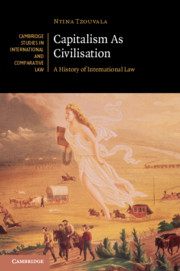Book contents
- Capitalism As Civilisation
- Cambridge Studies in International and Comparative Law: 142
- Capitalism As Civilisation
- Copyright page
- Contents
- Acknowledgements
- 1 The Standard of Civilisation in International Law
- 2 The Standard of Civilisation in the Nineteenth Century
- 3 The Institutionalisation of Civilisation in the Interwar Period
- 4 Arguing with Borrowed Concepts
- 5 From Iraq to Syria
- 6 Thinking through Contradictions on a Warming Planet
- Bibliography
- Index
- Cambridge Studies in International and Comparative Law
3 - The Institutionalisation of Civilisation in the Interwar Period
Published online by Cambridge University Press: 22 October 2020
- Capitalism As Civilisation
- Cambridge Studies in International and Comparative Law: 142
- Capitalism As Civilisation
- Copyright page
- Contents
- Acknowledgements
- 1 The Standard of Civilisation in International Law
- 2 The Standard of Civilisation in the Nineteenth Century
- 3 The Institutionalisation of Civilisation in the Interwar Period
- 4 Arguing with Borrowed Concepts
- 5 From Iraq to Syria
- 6 Thinking through Contradictions on a Warming Planet
- Bibliography
- Index
- Cambridge Studies in International and Comparative Law
Summary
This chapter analyses the colonial branch of the League of Nations, the Mandate System, and its pivotal role in the transmission and reconfiguration of ‘civilisation’ between the two world wars. Focusing on the workings of the Permanent Mandates Commission, it documents how ‘civilisation’ developed a rich institutional life and became an important argumentative tool for those both supporting and opposing the emancipation of Iraq from the British Mandate. Emphasising both transformation and continuity, this chapter examines the administrative and bureaucratic turn of the ‘standard of civilisation’ and the ways it became entangled with practices of counting, reporting and standard-setting. Furthermore, the rise of a basic level of welfarism as a marker of the ‘civilised state’ indicates that the ‘logic of improvement’ is not static, but it evolves in response to the changing imperatives and ideals of the capitalist state. The case of Iraq shows that even though international law does not determine imperial interests or major political evolutions, it does nonetheless provide a vocabulary to articulate and contest them.
Keywords
- Type
- Chapter
- Information
- Capitalism As CivilisationA History of International Law, pp. 88 - 128Publisher: Cambridge University PressPrint publication year: 2020
- 1
- Cited by



